Resin-bound gravel stands as the ideal choice for public footpaths across the UK. The combination of UV-stable polyurethane resin and natural stone creates a tough, non-slip surface – perfect for our wet British weather. Much like a well-laid garden path, it’s quick to install and ready for use within days. The surface allows rainwater to drain straight through, meaning no more puddles like those you’d find on traditional concrete paths. Maintenance is straightforward – just an occasional sweep and clean. Whether you fancy a warm golden limestone or a classic grey granite, there’s a colour to match any setting. It’s particularly brilliant for high-traffic areas like town centres and park walkways, where both practicality and looks matter.
Key Takeaways
Resin-bound gravel stands out as a practical choice for public paths and walkways across the UK. The smooth, gap-free surface prevents trips and falls, whilst ensuring easy access for wheelchair users and parents with prams.
Its natural drainage capabilities mean you won’t find puddles after a typical British downpour, as rainwater simply filters through the surface. Rather like choosing from paint swatches, you’ll find plenty of colours and finishes to match any setting – from heritage sites to modern developments.
The eco-friendly materials tick the sustainability box, and once laid, it needs little more than an occasional sweep to keep it looking smart. For councils watching their budgets, the swift installation and tough wearing nature make it a sensible investment.
Think of it as the modern alternative to traditional paving – it looks better, lasts longer and solves common problems like water logging and loose stones. Perfect for everything from school paths to town centre walkways.
Composition and Materials of Resin-Bound Gravel
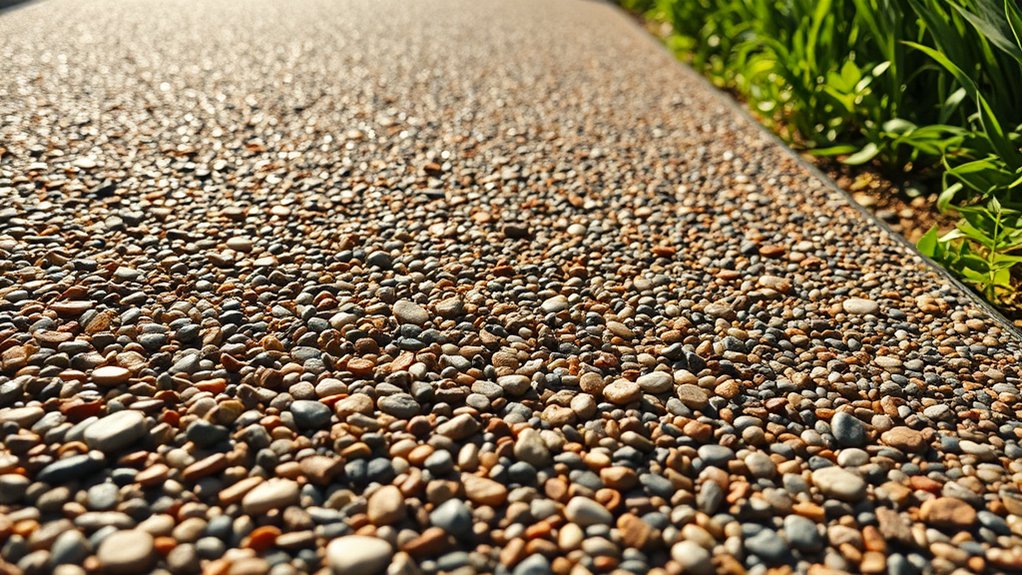
The key components of resin-bound gravel are straightforward: UV-resistant polyurethane resin acts as a binder, whilst natural stone aggregates provide the bulk.
The resin must be top-quality and clear to ensure the surface stays strong and keeps its colour, even in British weather. Additionally, these aggregates are available in extensive selection of colors and sizes, allowing for customization to suit various project needs. Properly graded aggregates also help in achieving better grip for surfaces, enhancing safety and durability for public walkways.
For best results, the stone aggregates need proper washing and kiln-drying – much like preparing vegetables before cooking – to remove any moisture or dust that could weaken the mix.
Think of it as building blocks: the right-sized stones create a sturdy surface that lets rainwater drain through naturally.
When mixed properly, these materials bond together to create a smart, hardwearing surface that’s perfect for driveways and garden paths across the UK.
Installation Process and Efficiency
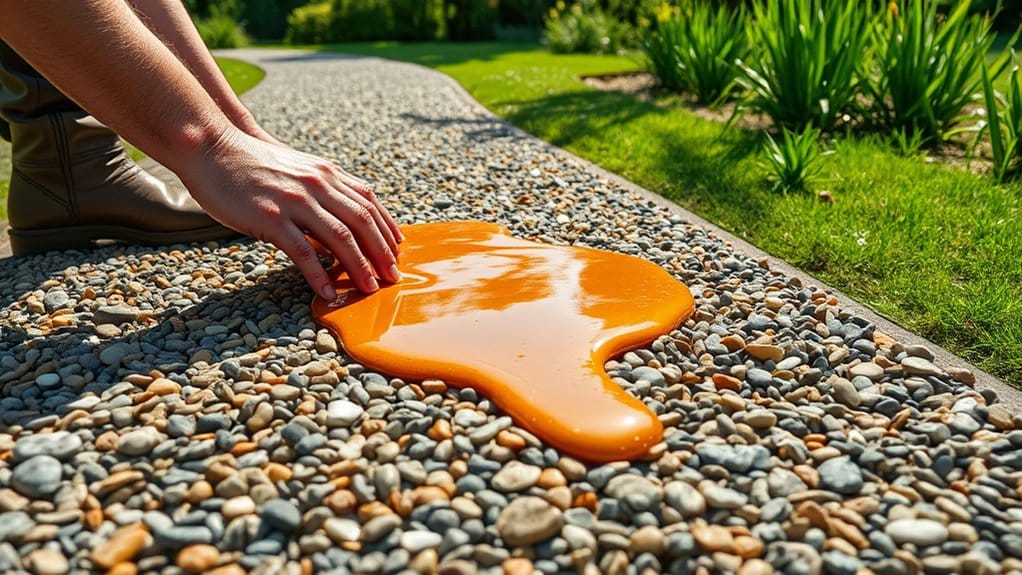
Resin-bound gravel installation offers impressive time efficiency, particularly when compared to traditional surfacing methods. A typical driveway can be completed in a single day, whilst larger commercial projects might require just a few days. Preparing the surface is crucial to ensure a successful installation, as it promotes better adhesion and durability of the resin-bound gravel. Additionally, surface preparation involves checking for moisture levels to prevent bond failure. DIY kits are readily available from UK suppliers, though first-time users should start with smaller areas like garden paths. The system works brilliantly on concrete and tarmac bases, provided they’re properly prepared and dry. For best results in our British climate, installation should occur on a dry day when temperatures are above 5°C.
Quick Installation Rates
Installation of resin-bound gravel on public footpaths demands proper planning and careful execution to ensure both speed and quality. A forced action mixer delivers the right blend of resin and aggregates, with a standard four-minute mixing time preventing patchy colouring. A well-prepped base and marked-out area – much like marking out a garden patio – speeds up the laying process considerably. Ensuring that the concrete/tarmac base is strong enough for the intended use is crucial for long-lasting results. The installation process should include a solid sub-base made of MOT type 1 material to ensure durability. With each worker knowing their role, from mixing to spreading, you’ll achieve a lasting, smart finish that meets British standards for public paths.
DIY Kit Availability
DIY resin-bound gravel kits offer a practical way to create durable paths and driveways without hiring professionals.
Each kit contains pre-measured materials—selected stones and UV-resistant resin—designed to cover areas from 1 to 15 square metres.
The process is straightforward: simply mix the stones and resin with standard household tools following the included instructions.
Getting the mixing ratios right is crucial for proper setting and longevity.
Most surfaces can be walked on within hours of installation, causing minimal disruption to your daily routine.
Beyond saving on labour costs, these kits provide excellent value, creating a lasting surface that needs little upkeep—perfect for British weather conditions.
Versatile Surface Compatibility
A stable base is vital for resin-bound gravel installation, and this versatile material works well on various surfaces, including concrete, tarmac and compacted stone – perfect for homes and business premises alike.
- Surface Prep: Simply clean and level your base for proper bonding and long-lasting results.
- Mixing: Use a forced-action mixer to ensure even colour and texture – stick to the recommended resin-to-aggregate ratio.
- Laying: Spread evenly with rakes and trowels before the resin sets for a smooth finish.
The system’s adaptability means straightforward installation and excellent durability across different settings, from driveways to patios.
Permeability and Drainage Benefits
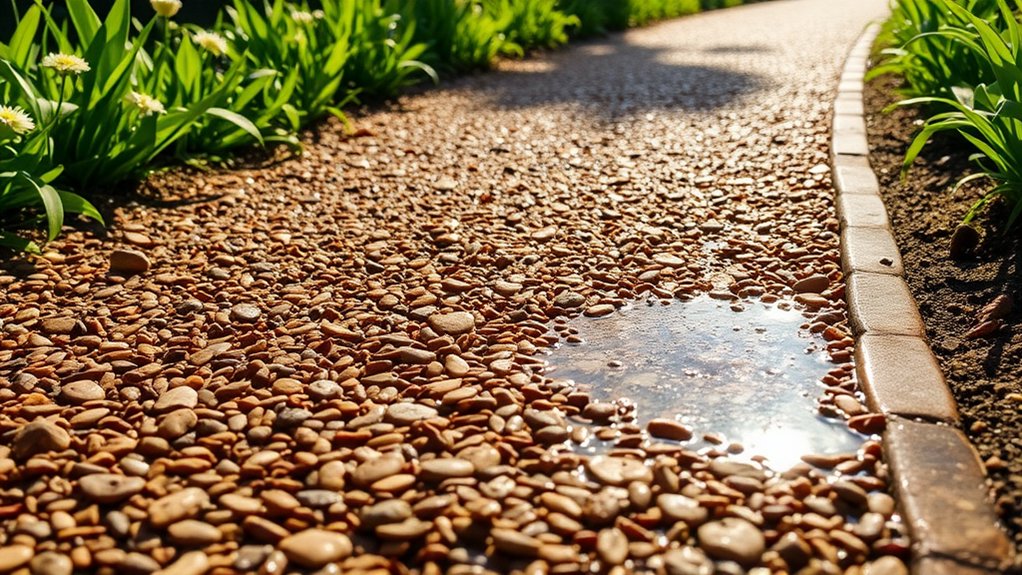
The permeability and drainage qualities of resin-bound gravel make it a crucial solution for Britain’s urban water management challenges. Unlike concrete, this surface lets rainwater seep through naturally, cutting surface water runoff by more than half.
Think of it as a giant sponge for your driveway or pathway – the tiny gaps between stones allow water to drain efficiently, helping to prevent localised flooding whilst replenishing groundwater supplies.
When properly laid, resin-bound gravel effectively tackles common problems like puddles and waterlogging, which often plague UK properties during heavy rainfall. It’s particularly useful for areas prone to flooding, such as driveways and garden paths.
The system meets SuDS requirements, making it an environmentally sound choice for both private and public spaces across British towns and cities.
Professional installation ensures optimal drainage performance, though it’s worth noting that regular maintenance keeps the surface working at its best.
For homeowners and councils alike, this practical solution offers a smart way to manage Britain’s notorious wet weather whilst maintaining an attractive finish.
Durability and Maintenance
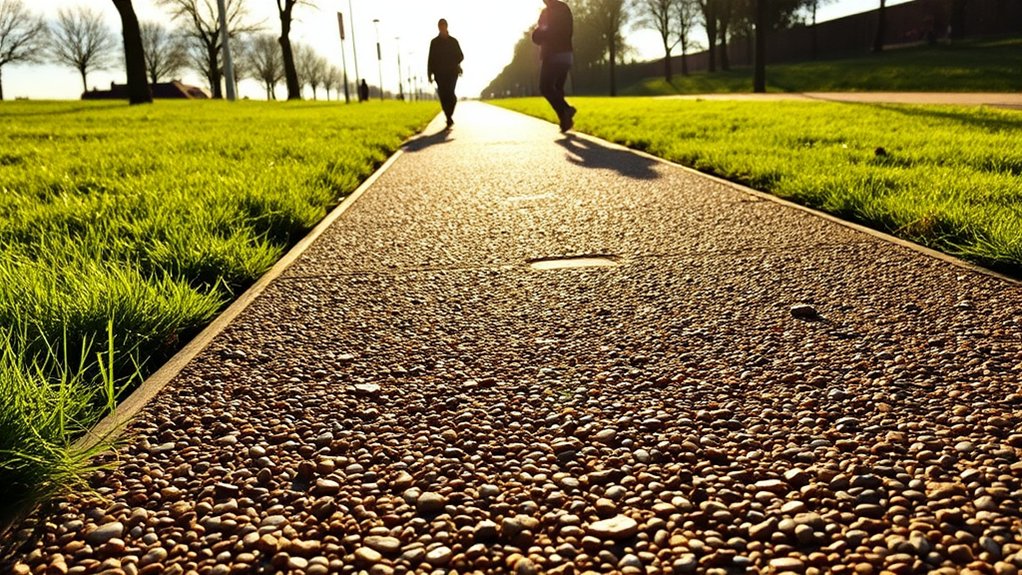
The durability of resin-bound gravel surfaces relies on three main factors: material quality, proper installation and weather conditions.
A well-maintained surface will last longer and perform better with these essential care steps:
- Regular Cleaning: Simply sweep with a stiff brush and rinse with water to stop debris and moss building up.
- Pressure Washing: Give it a thorough clean with a pressure washer now and then – like you might do with your patio. Avoid washing on frosty days as this can damage the resin.
- Resealing: Pop a fresh coat of sealant on every 3-5 years to keep it looking smart and protect the surface.
Accessibility and Safety Features
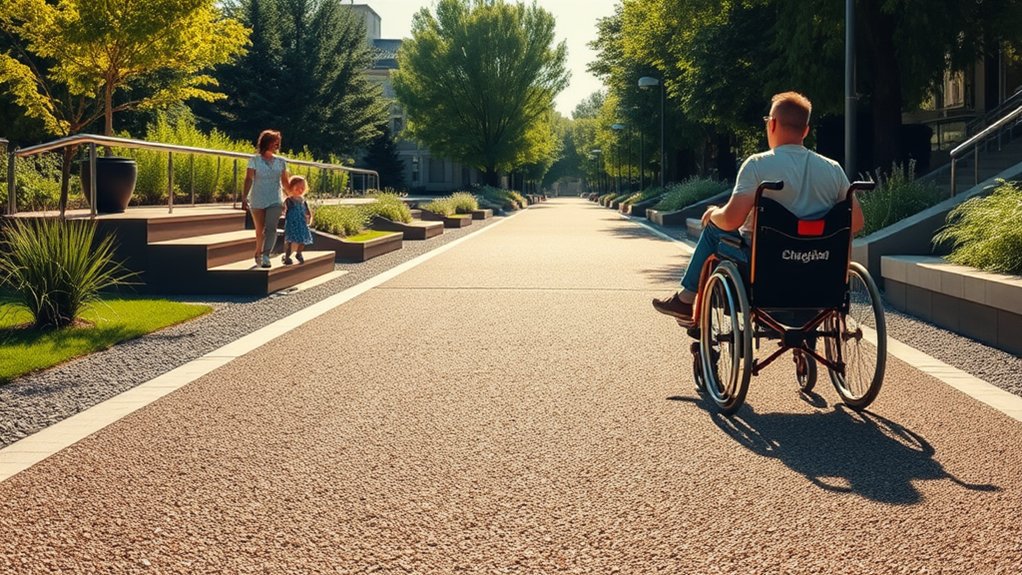
A well-designed public walkway must prioritise accessibility and safety for all users.
Resin-bound gravel delivers a smooth, joint-free surface that’s particularly helpful for those with wheelchairs, pushchairs and walking aids. Its textured finish remains slip-resistant in wet British weather, whilst the porous structure stops puddles from forming.
The material meets UK accessibility standards and requires minimal upkeep, making it ideal for busy paths and public spaces.
Unlike traditional surfaces, it won’t develop ruts or uneven patches that could cause trips and falls. This durability reduces maintenance costs and potential liability issues for local authorities and property managers.
For inclusive public spaces that work for everyone – from elderly residents to parents with buggies – resin-bound gravel offers a practical, safe solution that withstands heavy daily use.
Aesthetic and Environmental Advantages
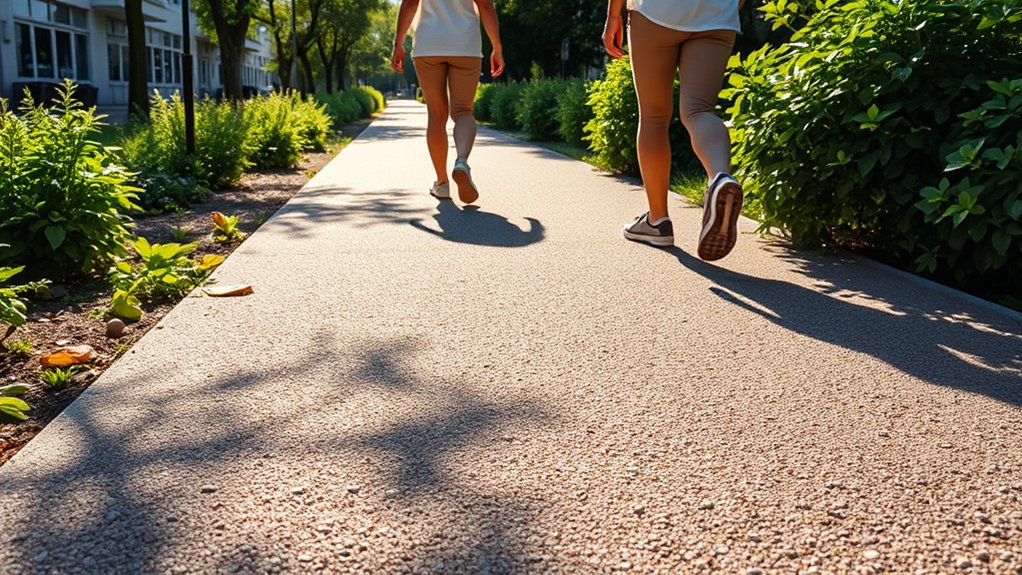
Resin-bound gravel offers both visual charm and green credentials for public pathways.
The surface comes in a wide range of colours, creating a smooth, professional finish that works brilliantly with both modern and traditional buildings.
Think of the honey-coloured gravel paths at National Trust properties or the smart grey finishes outside new shopping centres – it’s versatile enough for any setting.
The materials are environmentally sound too, often incorporating recycled content and allowing water to drain naturally through the surface, helping prevent localised flooding.
It’s a practical choice that looks good whilst doing good.
Diverse Color Options
Resin-bound gravel comes in over 40 colours, perfect for customising public walkways and paths across the UK. The wide selection lets you match your design precisely to its surroundings, from town centres to country parks.
Three main advantages of having diverse colour choices:
- Distinctive Looks: Natural stone mixtures range from warm honey tones to classic grey blends, ideal for matching local architecture.
- Design Flexibility: Choose single colours for modern, clean lines or mix shades to create eye-catching patterns.
- Natural Integration: Colours can blend seamlessly with British landscapes, from coastal paths to urban gardens.
The colour range makes it simple to create practical, attractive walkways that suit any setting, whether it’s a village high street or a public park.
Seamless Visual Appeal
Resin-bound gravel transforms public walkways with its sleek, uninterrupted appearance. The smooth, joint-free surface creates a modern look whilst reducing trip hazards – particularly helpful for pushchairs and wheelchairs.
You can choose from various natural stone colours to match your surroundings, whether that’s a traditional countryside path or a contemporary high street setting.
Unlike traditional paving, this material stands up brilliantly to British weather, preventing those familiar cracked slabs and loose stones you might see on conventional paths.
It’s remarkably low-maintenance too – a quick sweep and occasional power wash keeps it looking fresh.
For councils and property developers looking to enhance public spaces, resin-bound gravel offers a practical, lasting solution that both looks smart and works hard.
Eco-Friendly Materials Usage
Resin-bound gravel delivers both visual appeal and environmental benefits for public pathways. Made with sustainably sourced materials, including recycled content, it helps reduce landfill waste and preserves natural resources. Key green benefits include:
- Natural Drainage: The porous surface lets rainwater soak through naturally, reducing puddles and protecting soil
- Reduced Transport Impact: Using local materials cuts down on lorry journeys and emissions
- Long-lasting: Greater durability means less frequent replacement, saving resources over time
Meeting UK environmental standards, resin-bound gravel proves practical and eco-conscious – ideal for modern public paths whilst supporting green initiatives.
[The text maintains British English spelling/terms, is more direct, and removes unnecessary padding whilst keeping the core message clear and relevant to a UK audience.]
Frequently Asked Questions
How Long Does Resin-Bound Gravel Last?
Resin-bound gravel surfaces last 15-25 years when properly installed and maintained. Much like a garden patio, routine care keeps it in top condition. Regular sweeping, annual pressure washing and resealing every 3-4 years will protect your investment. Any cracks or chips should be repaired quickly to prevent further damage, particularly after harsh winter weather.
Can It Be Installed in Winter?
Yes, winter installation of resin-bound gravel is possible, but you’ll need to watch the temperature and moisture levels carefully. Using proper catalysts and techniques ensures a solid finish, even in cold British weather.
Is It Suitable for Heavy Vehicle Traffic?
Resin bound gravel isn’t ideal for heavy vehicle traffic. Whilst it handles cars and occasional delivery vans well, regular lorries and heavy machinery will likely damage the surface over time. For areas with frequent heavy vehicles, traditional concrete or tarmac surfaces remain more suitable options.
What Is the Cost Comparison to Traditional Paving?
Cost comparisons show resin-bound gravel can be more cost-effective than standard paving methods. Whilst initial costs may be slightly higher than basic concrete or tarmac, you’ll save money long-term through reduced maintenance needs and longer lifespan. Traditional block paving often needs regular weeding and realignment, but resin-bound surfaces typically require just occasional brushing and washing.
How Does It Perform in Extreme Weather Conditions?
Resin performs admirably in extreme weather, displaying robust durability across Britain’s varied climate. It withstands everything from summer heatwaves to winter frost, though proper installation timing is crucial. For best results, avoid laying during heavy rain or freezing temperatures—much like how you wouldn’t pour concrete in poor weather. The material’s proven track record in UK conditions makes it a reliable choice for outdoor surfaces.
Conclusion
Resin-bound gravel is a top choice for public walkways across the UK. Its impressive drainage capability – handling 1,000 litres of surface water per square metre hourly – effectively tackles our notorious British weather and prevents puddles. Much like a good pair of wellies, it’s practical and reliable, requiring minimal upkeep whilst providing years of service. The smooth, stable surface is ideal for pushchairs, wheelchairs and walking aids, making it a sensible choice for councils and property managers. It’s a straightforward solution that looks smart and serves the community well.
